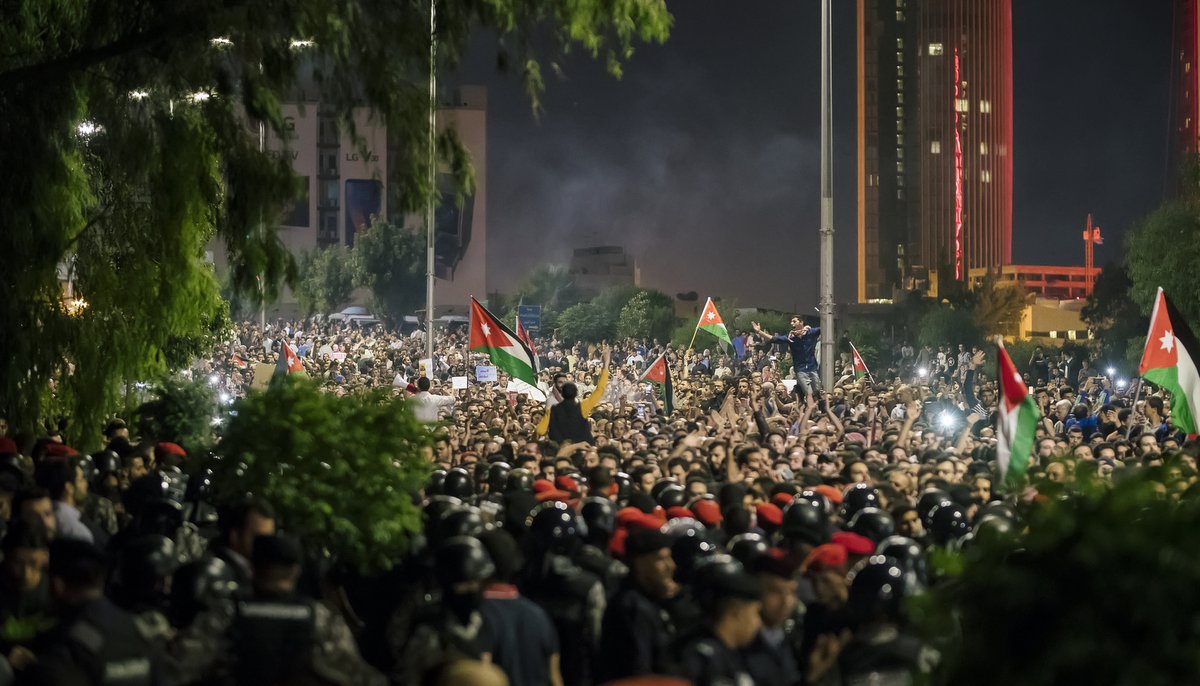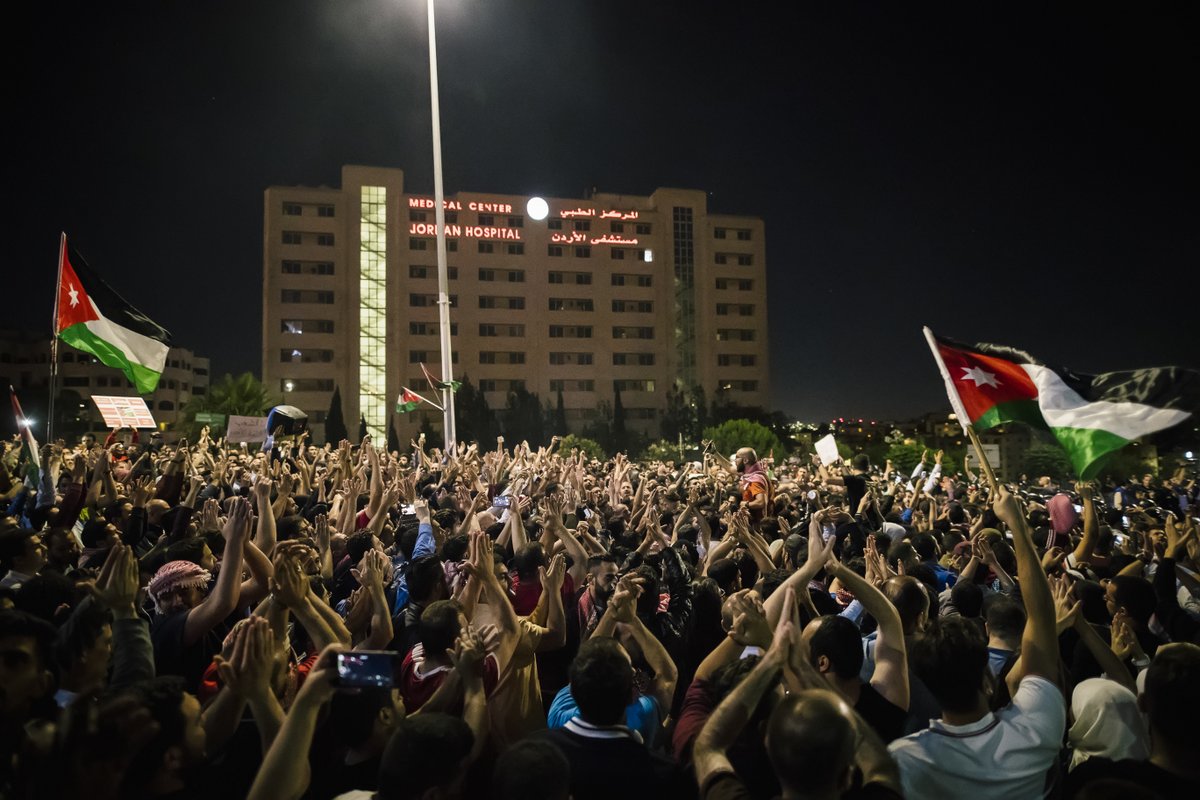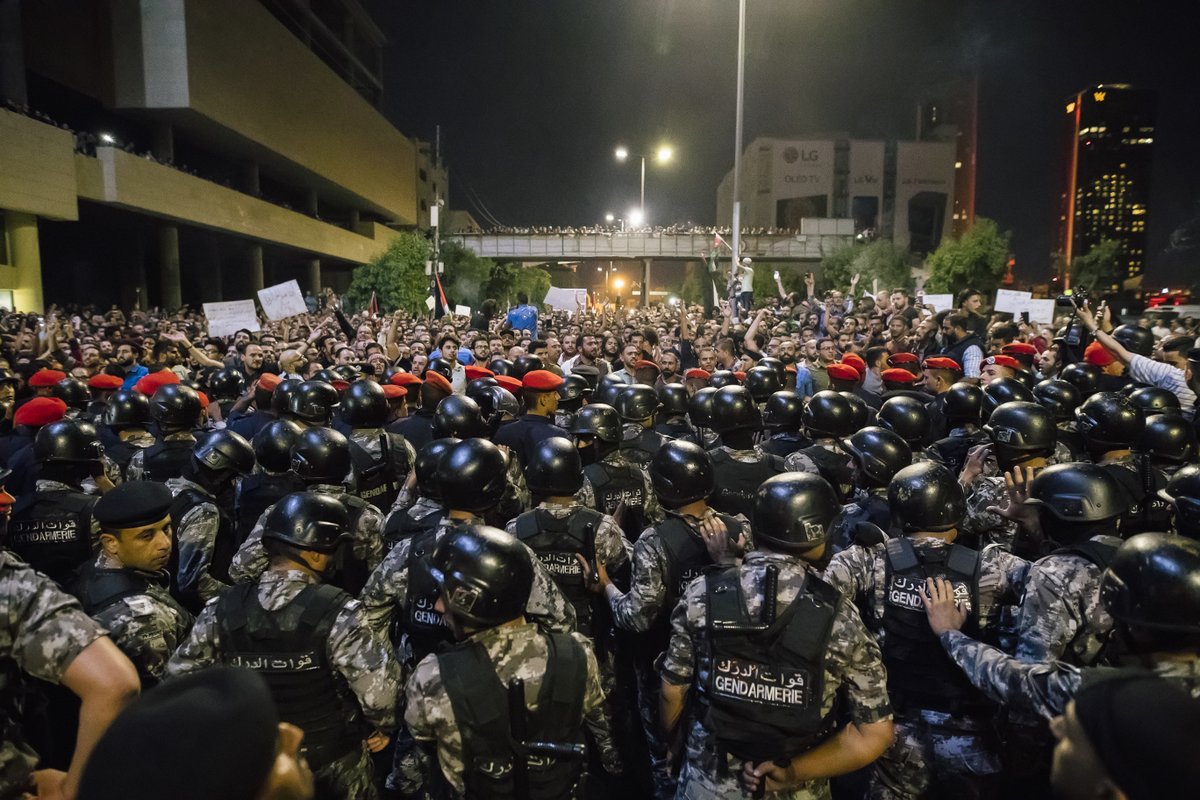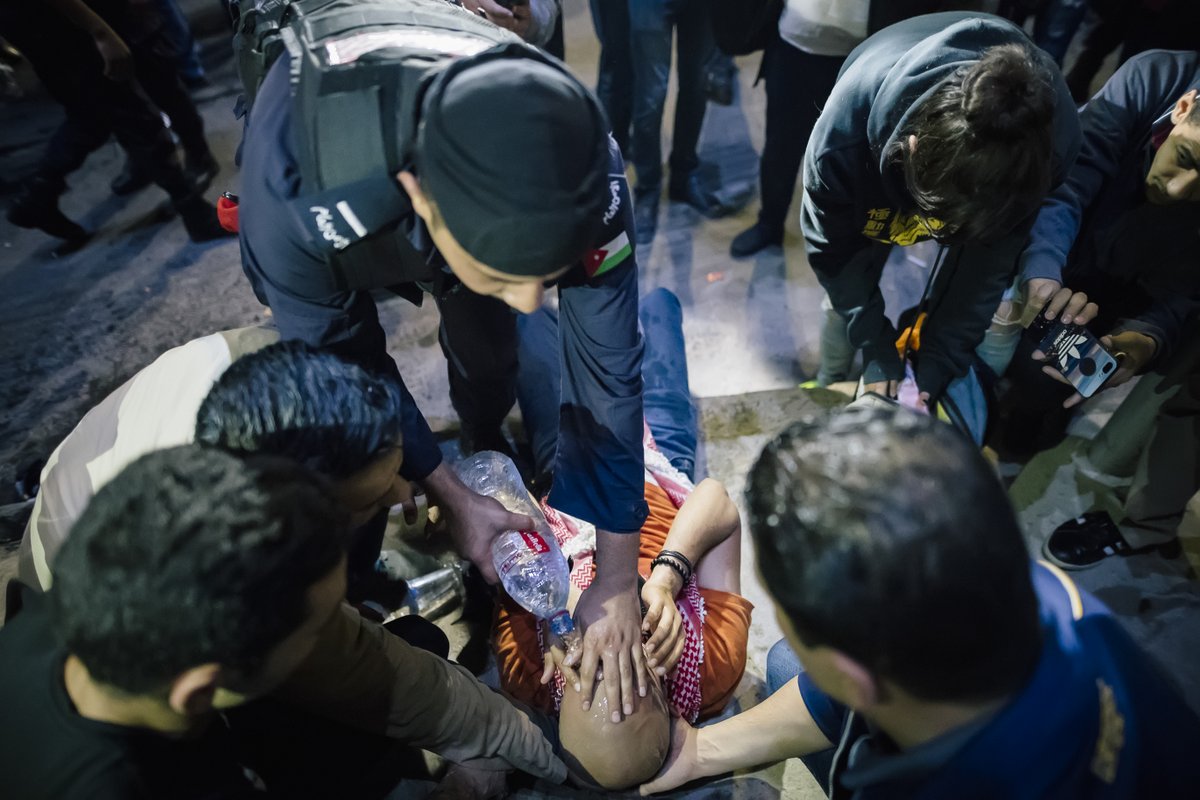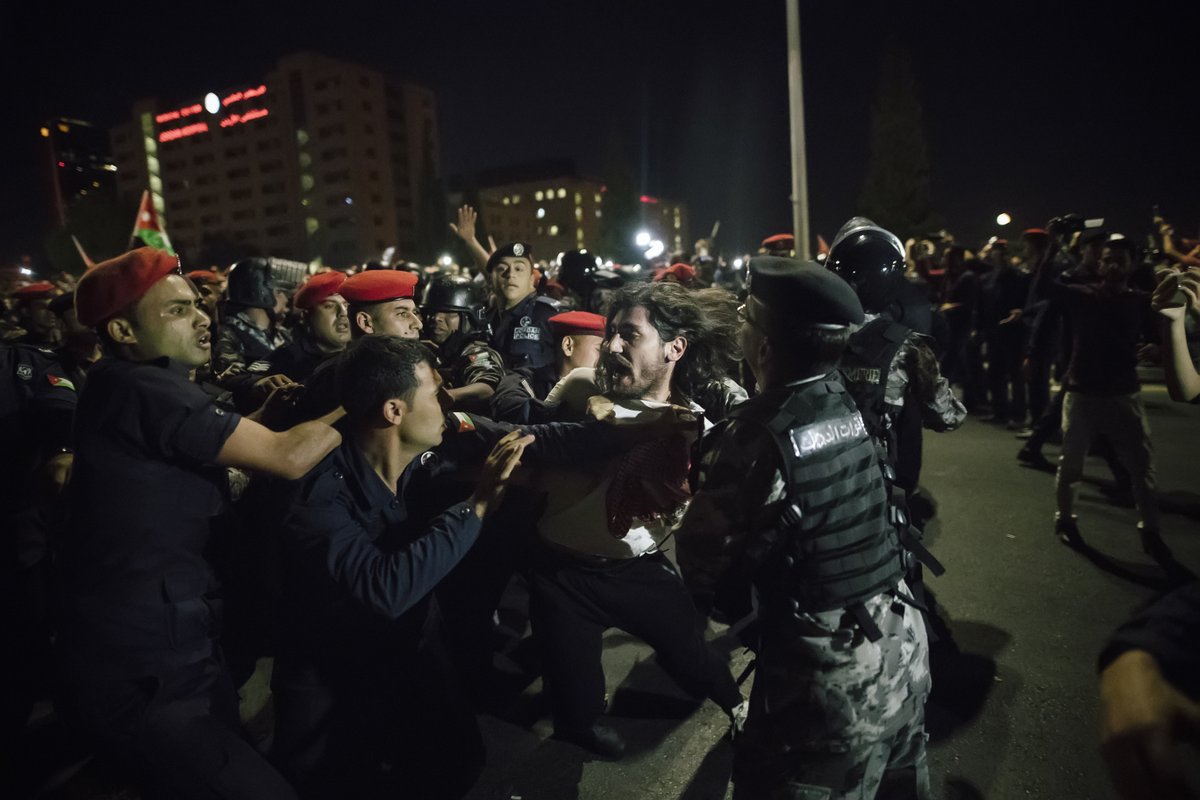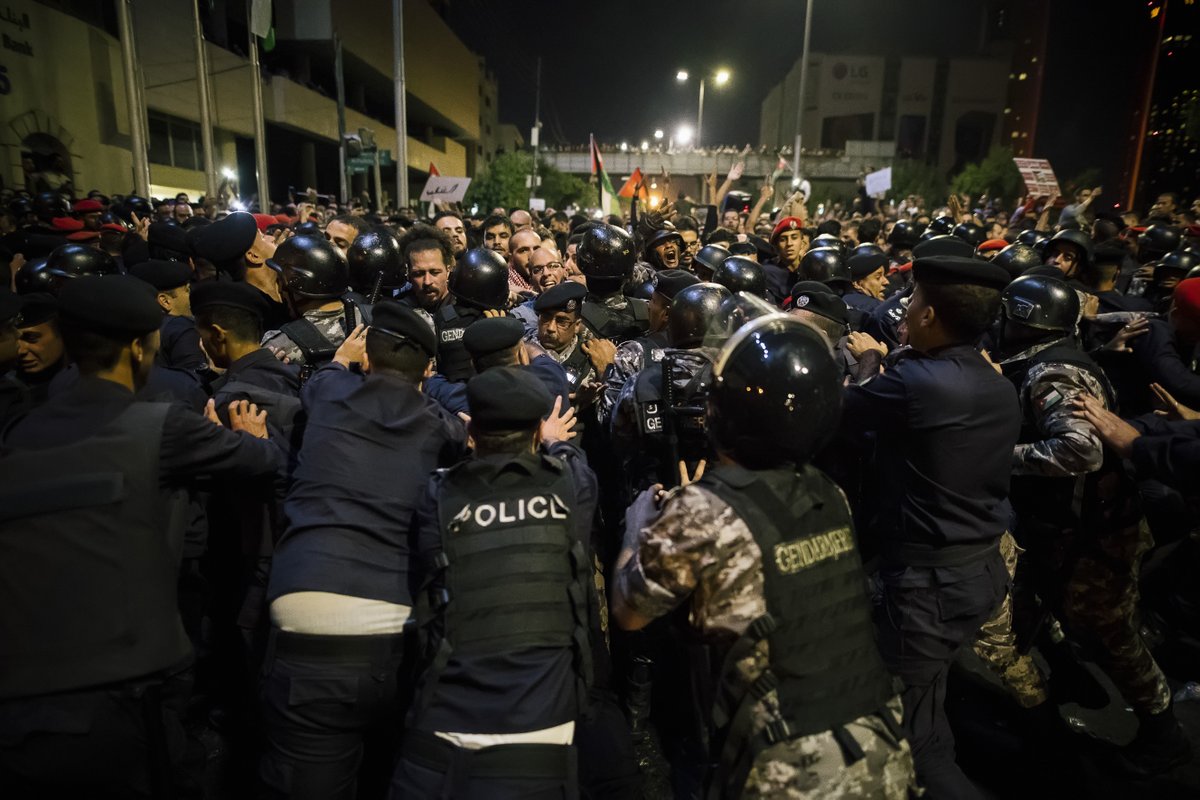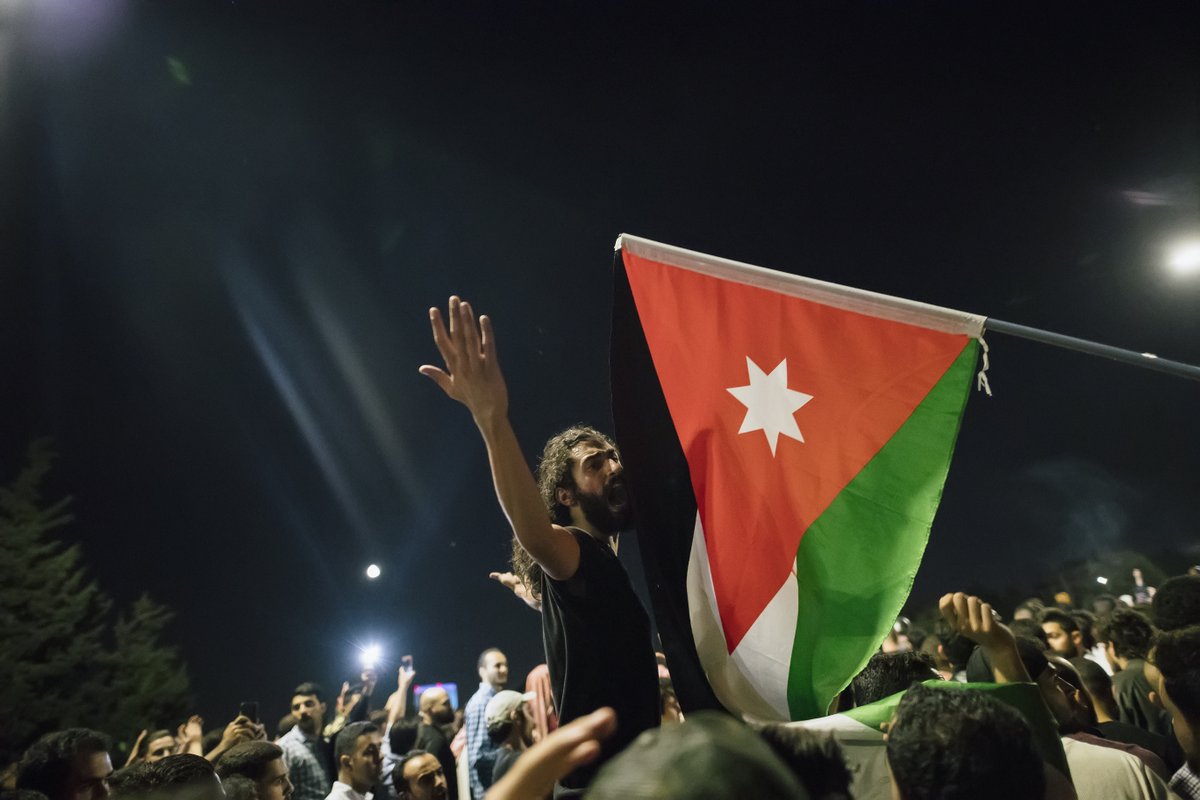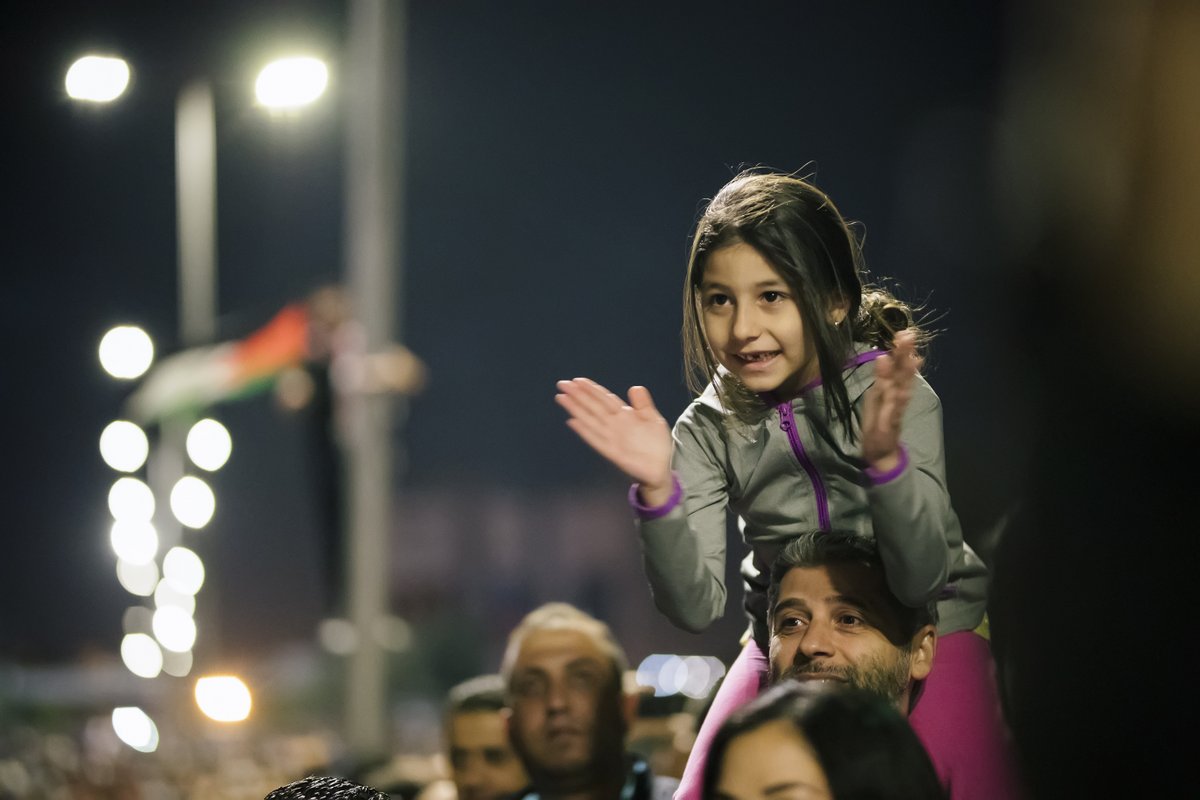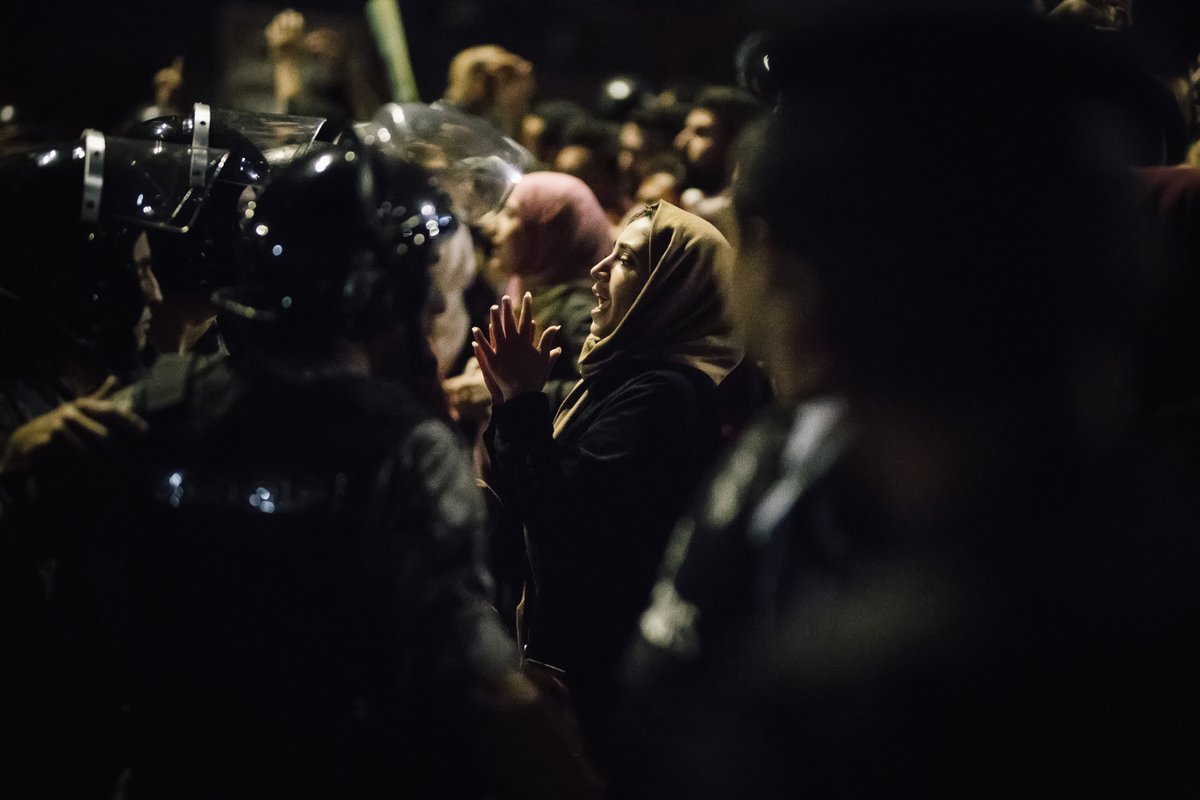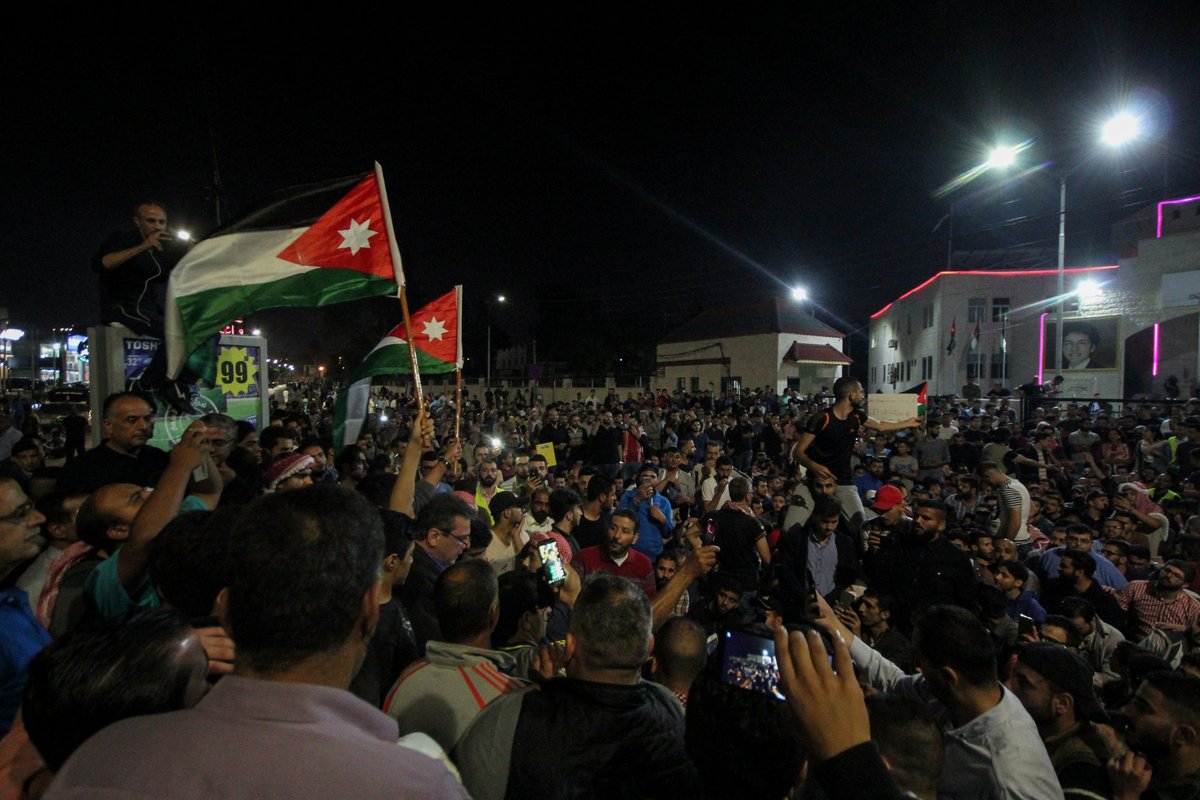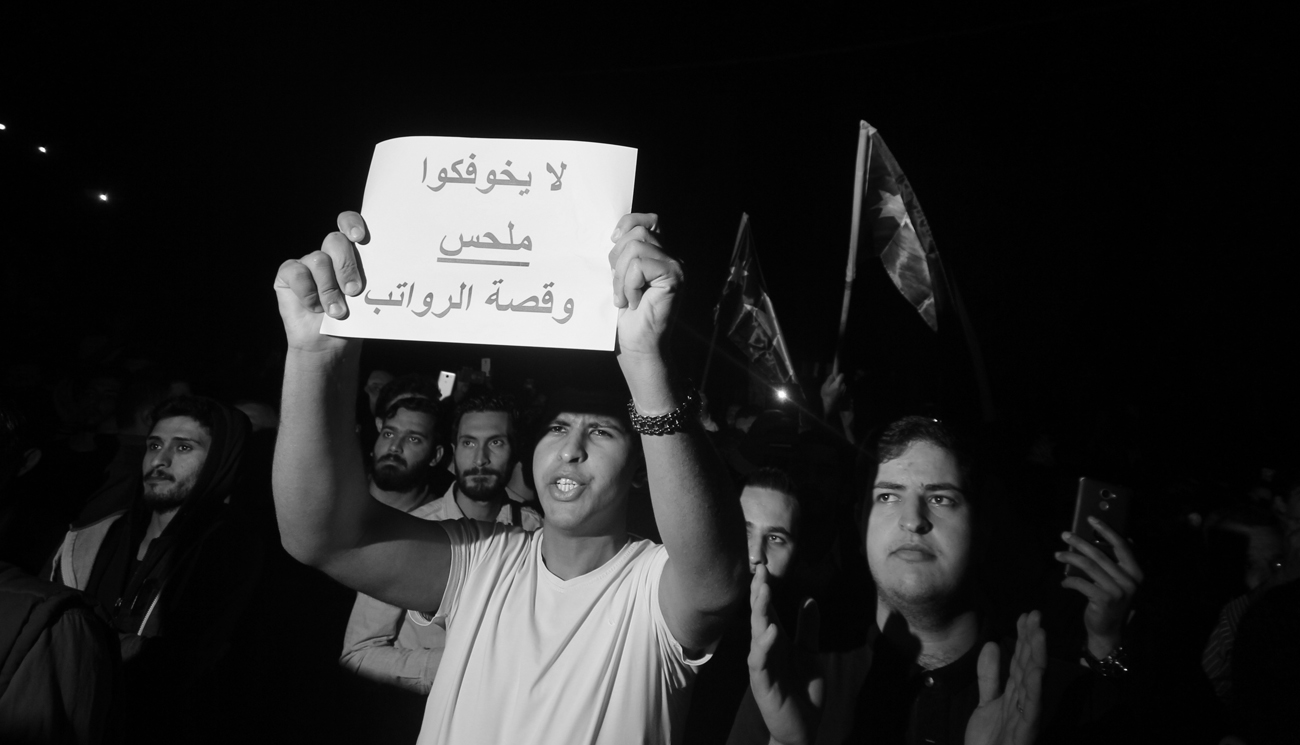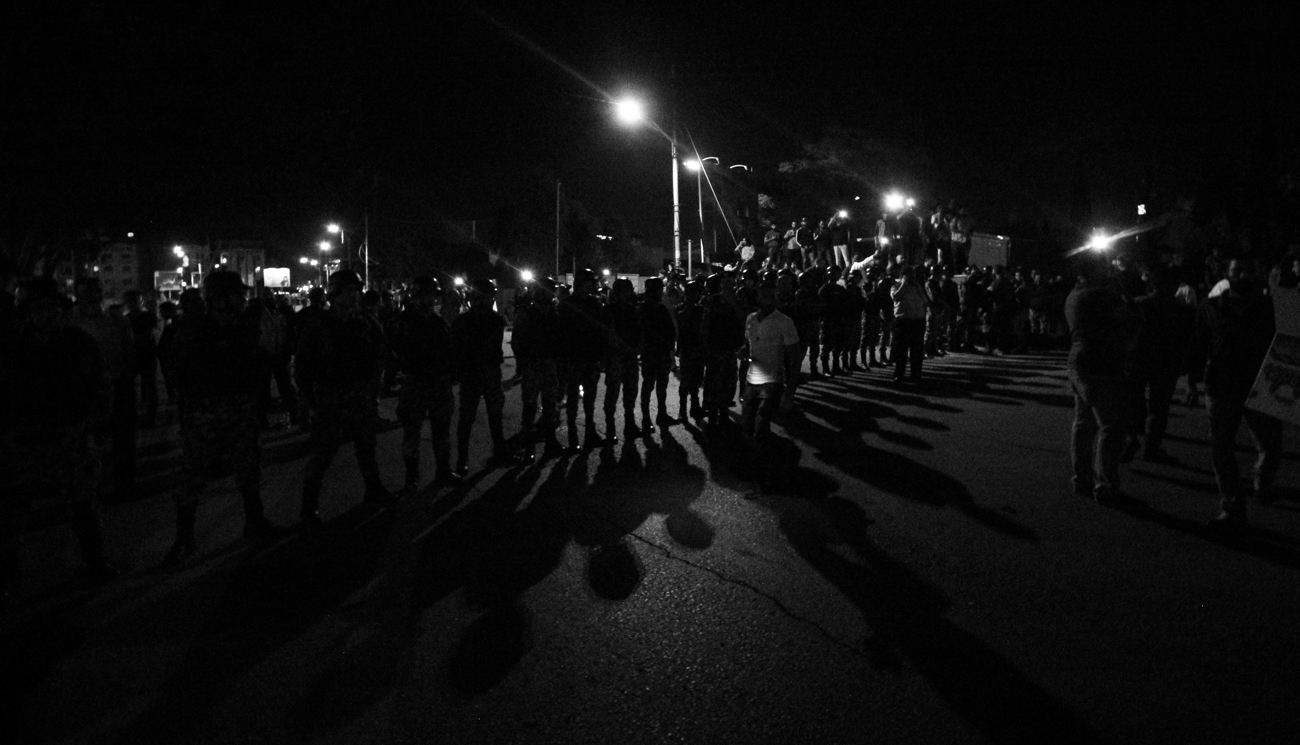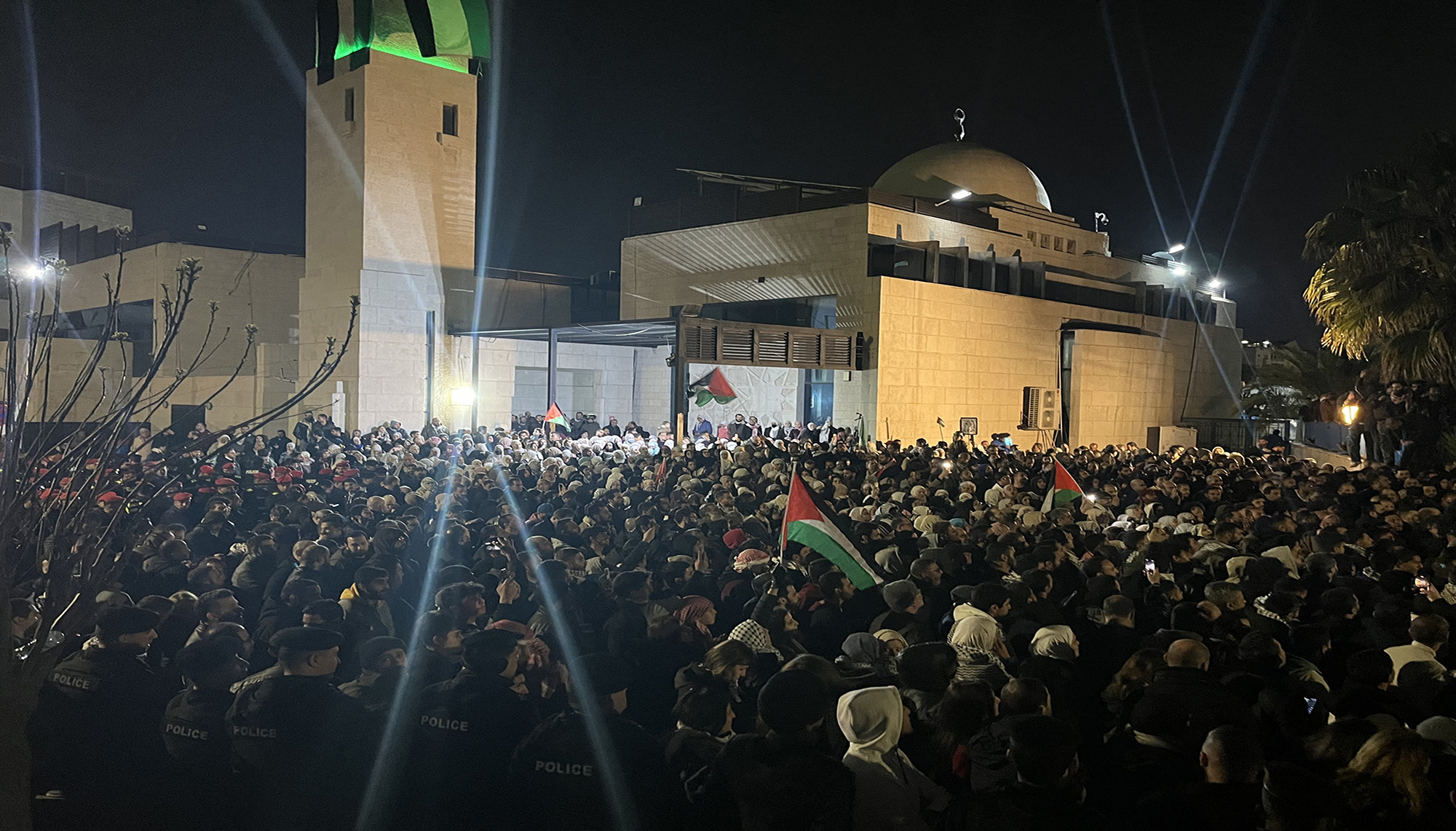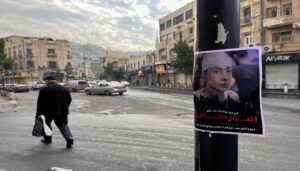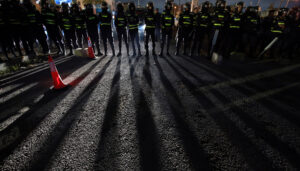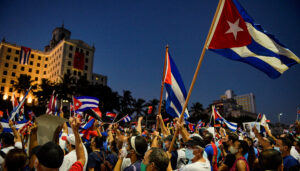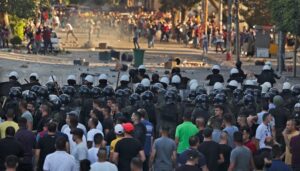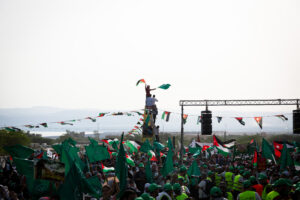By Dana Gibreel, photos by Ali Saadi in Amman and Mo’men Malkawi in Irbid
Thousands of Jordanians took to the streets for the fourth consecutive day to protest the state’s economic policies and demand the sacking of PM Hani Almulqi’s government.
This wave of protests started after the professional syndicates called for a general strike last Wednesday against the proposed amendments to the tax law, which the government presented to Parliament last month, and which lowers the annual tax exemption threshold for individuals and families, and increases corporate tax on most industry sectors. The day after the strike, the government raised fuel prices following recommendations from the “fuel pricing committee”, which reviews and sets fuel prices on a monthly basis.
This wasn’t the first time fuel prices are increased in 2018, but this last price hike drove thousands to the streets on Thursday night in spontaneous protests near the Prime Ministry in Amman and in other cities across Jordan, the scale of which Jordan hasn’t seen since what came to be known as the Tishreen [November] Uprising in 2012.
On Friday morning, the government retracted the decision to raise fuel prices, following orders from the King, who instructed the prime minister to halt the price hike “because of difficult economic conditions during the month of Ramadan”.
But this retraction did not stop thousands from taking to the streets again on Friday night, in growing protests that started addressing more than just the tax law and fuel prices. The protests became a platform for a growing list of grievances, primarily IMF-driven austerity measures, but also the way the country is governed. Slogans in these protests included “We will not be ruled by the World Bank!”, and “We want to change policies, not governments!”
Amman
For the fourth consecutive night, security forces blocked thousands of protesters from reaching the Fourth Circle next to the Prime Ministry, following a decision from Amman’s governor on Thursday banning protests there.
Thousands gathered after Iftar on Sunday night at nearby Shmeisani Circle, and marched towards Fourth Circle before being blocked by security forces. They were later joined by another group that drove from the Al-Tafayleh neighborhood in East Amman towards the Prime Ministry.
Another group of protesters gathered at the other side of Fourth Circle, towards the Fifth, and attempted to reach the roundabout but were prevented by gendarmerie.
The demonstrations continued until 2:00 am and concluded peacefully, but one protester was arrested at the end and remains detained until the time of publishing this report.
Chants varied, and included ones directly against the IMF such as “You who lives in Dabouq [referring to the King], down with the rule of the [International Monetary] Fund”. They also demanded the sacking of Mulqi’s government, fighting corruption, and elected governments. This comes after the PM said his government cannot retract the tax law because of its commitments to the IMF.
According to Khaberni news website, six gendarmerie and security officers were injured and taken to hospital as a result of friction with protesters.
After the protest concluded, news websites reported that Crown Prince Hussein visited gendarmerie forces near Fourth Circle. In a video posted by “Hala Akhbar”, the Crown Prince told gendarmerie officers that “the King sends you his regards (…) the most important thing is to protect citizens and this is what you did today, let them talk and express their opinions”.
In the town of Sahab, protesters gathered at the Martyr’s Circle for the fourth consecutive night demanding the fall of the government, the retraction of the tax law, and improvement of living conditions. They chanted “Rise up, Sahab! Change will come forcefully!”, and “Potash [company] tells it all. They sold it and cried: bankruptcy!”
Some protesters then moved from Sahab to Fourth Circle. Activist Ahmad Abu Zaid told 7iber that starting the protest in Sahab before moving it to Fourth Circle comes to emphasize the importance of having more than one protest point demanding the improvement of living conditions.
Outside Amman
In Al-’Arda in the governorate of Al-Balqa, a demonstration started after Tarawih prayers, and decried the selling of national resources and the hikes in prices and taxes. The protest continued until 1:00 am, and at some points caused road closures with burning tires, according to eye-witness accounts and videos sent to 7iber.
In Irbid, hundreds participated in a protest in front of the syndicates’ building, and chanted against economic policies that led to growing public debt and dependence on organisations like the World Bank and the IMF. They demanded the resignation of the government and a change in general governance policies. Gendarmerie forces prevented protesters from reaching the governor’s office.
In the southern city of Tafilah, a demonstration began near the Big Mosque downtown and headed towards the governorate building. There was no presence of security forces, according to activist Sa’ed Al-Oran.
Al-Oran said that the protesters raised slogans asking that those “who sold the country” be held accountable.
There were other smaller protests in villages around Tafileh, according to Al-Oran.
In Karak, a protest began in front of the governorate building and turned into a demonstration in the streets of Al-Marj, according to journalist Hussein Al-Sarayrah. Newly-elected head of the Engineers’ Union Ahmad Samara Al-Zu’bi spoke at the protest and stressed the importance of withdrawing the proposed tax law.
After Al-Zu’bi left, protesters chanted against economic policies, government, and parliament, and demanded economic and political reforms. They also announced that Karak will join the national strike and day of civil disobedience called for by the national syndicates this coming Wednesday.
In Ma’an, demonstrators marched towards the governorate building, and some of them blocked part of the desert highway with burning tires for the second day in a row, according to eyewitnesses.
In Mafraq, protesters said that the government discourse is “provocative”, according to activist Anas Al-Ashoush. They criticized a recent statement by the Finance Minister in which he said that the government might not be able to pay public sector salaries next month. They also decried the PM’s statement that the government cannot retract the tax law. They chanted “You’ve impoverished Jordanian people and mortgaged them to the World Bank”.
There were other protests in Aqaba, Salt, and Zarqa, with demands similar to those of other governorates.
Earlier on Sunday, hundreds of students at the University of Jordan held a protest on campus demanding a halt to price hikes. They chanted “We students are with workers against the gang of capitalists”, and “Come and see oh you minister, listen to the voice of the people”.
The Council of Syndicates announced on Sunday that a general strike will be held on Wednesday June 6, all day, and will include a demonstration in front of the Professional Syndicates’ Complex in Amman to demand the retraction of the proposed tax law.
Some members of the Senate said that they sent two recommendations to the King, one to ask the government to retract the tax law and form a national dialogue committee, and another to issue a royal decree to hold an extraordinary Parliament session immediately to reject the law.
The General Security Directorate said it will hold a press conference on Monday for the heads of Police and Gendarmerie forces to talk about the protests across Jordan.
